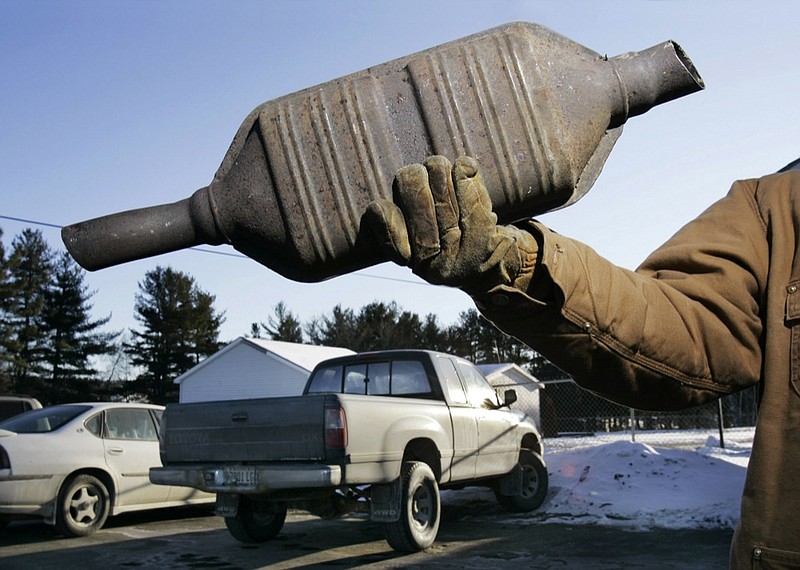John Baldwin often exercised on a trail northwest of Nashville until one afternoon, after a 30-minute hike and drive home, he realized there was something wrong with his Toyota Tacoma.
"It was this horrible sound that he had never heard before," said his wife, Kim Baldwin.
A tow service driver promptly slid under the vehicle and found the cause of the problem.
"Yep, your catalytic converter is gone," said the driver, noting that this was not the first such call he had received recently.
Nationwide, catalytic converter thefts are on the rise, and Tennessee is no exception. Throughout the state, police departments tracking catalytic converter thefts found that there has been a significant increase this year in comparison to previous years.
In Chattanooga, officials reported that from Jan. 1 to June 27, there were 458 cases of catalytic converters stolen, compared to 92 in 2020.
In Knoxville, police officials reported that from Jan. 1 to March 7, there were 47 reports of catalytic converter thefts. That same period in 2020, there had only been seven reported cases.
Catalytic converters are exhaust emission devices used to reduce pollutants created by a vehicle's internal combustion engine. Thieves found that stealing the devices was a lucrative business because of the precious metals they contain.
According to the National Insurance Crime Bureau, as of December 2020, rhodium was valued at $14,500 per ounce, palladium at $2,336 per ounce and platinum at $1,061 per ounce. Typically, scrap metal dealers will pay $50 to $250 per catalytic converter.
And they're relatively easy to steal, said Scott Erland, spokesperson for the Knoxville Police Department.
"More or less, in a lot of cars, they're taken pretty quickly. You have to go under a car to do it obviously, but if you know what you're doing, you get under there and get away really quickly," he said.
Thieves tend to target cars parked in poorly lit, isolated areas. Reports came from parking lots, streets and businesses with a large number of parked cars, such as rental car lots and churches, according to Elisa Myzal, spokesperson for the Chattanooga Police Department.
And while the thefts are quick and easy, the victims are left with expensive damages.
Although amounts depend on the car and its condition, repairs cost anywhere from $700 to $1,000, said Pat Williams of Barton's Car Care in Memphis, who said he'd fixed 50 cars with stolen catalytic converters in the past few months.
A new state consumer protection law aims at curbing the rising number of thefts by making purchases of scrap metal more difficult. As of July 1, any person engaged in the business of buying or selling scrap metal - including catalytic converters - is required to be registered as a scrap metal dealer and must notify the local chief of police and sheriff. By registering with the police, scrap metal dealers become a part of the Tennessee Department of Commerce and Insurance's Scrap Metal Registration Program, which includes providing thumbprints.
Despite that, some scrap metal dealers remain unconvinced those measures are enough to stop the thefts.
Billy Hogan, owner of John's Recycling in Chattanooga, said that between his shop and numerous others, there was evidence of a single man who allegedly stole 21 catalytic converters.
On the day Hogan spoke with Tennessee Lookout, he said he had purchased three vehicles that day - all with missing catalytic converters.
As for the Baldwin family, their truck spent five weeks in the mechanic shop since the thieves had caused thousands of dollars in damages.
"In addition to stealing the catalytic converter, they also incidentally broke the whole computer system and the frame," Kim Baldwin said.
Thankfully, the Baldwins only had to pay the deductible through their insurance, although insurance companies' coverage of thefts depends on the victim's policy.
The situation could have been much worse, Baldwin said, because the Toyota Tacoma had several catalytic converters, and the thieves only found one.
Read more at TennesseeLookout.com.
